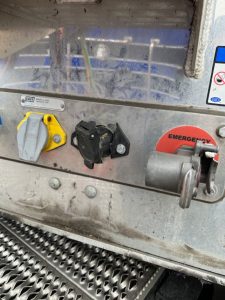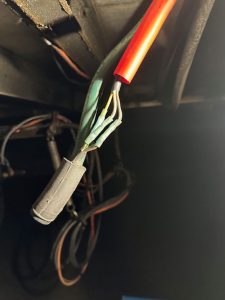When your car starts to leak gasoline, it may be more than just a little annoyance. Fuel leaks are hazardous; they might start fires, harm the environment, and, if not swiftly corrected, cost a lot. Mobile car technicians then come in quite handy. Whether you’re parked in a parking lot or stuck on a roadside, these educated experts come right to you. Mobile techs bring equipment, experience, and a cool attitude to rapidly address the issue rather than waiting for a tow truck or running the danger of a fire. They find the reason and correct it exactly where the problem arises, not only patch things up. This article covers how mobile techs properly handle fuel spills, their procedures, and the reasons swift action is always the wise course of action.
Spotting the First Signs of a Fuel Leak
Techs depend on a sharp eye—and nose—before any action starts. Most fuel leaks start off tiny. Often, the first indicator is a heavy gasoline scent, particularly around the car. Under the gasoline tank or close by the engine comes a clear puddle or moist area. Drivers can find warning lights or low fuel economy.
Mobile techs are taught to find the leak fast. They look over injectors, tank seams, fuel lines, and connections. Leaks can develop from age, heat, corrosion, or physical damage since fuel systems can comprise both metal and rubber components. Often, with a flashlight and mirror, a careful visual check helps quickly identify the issue area.
They also probe the motorist on things like “When did you first notice the smell?” or “Has the check engine light come on?” These hints cut wasted time on guessing and help focus the search.
Taking Safety Steps Before Repairs Start
Fuel is quite flammable; thus, the primary concern is safety. Mobile techs exercise care to prevent sparks and fire threats once the leak is verified. Turning off the car and separating onlookers comes first. They keep fire extinguishers close in the case and don gloves and eye protection.
They then cut the battery to lower the chance of electrical sparks. If fuel has accumulated, they tidy it using sand or absorbent mats. This saves the environment and stops fires.
Crucially important is ventilation. They check for airflow and whether it is operating in an enclosed location or a garage. If outside, they look at the wind direction to make sure vapors aren’t gathering close to their tools or equipment. Though basic, these early safety precautions are essential when handling fuel leaks.
Pinpointing the Source of the Leak
The tech starts tracking the leak once it is safe to work. From the gas tank and working toward the engine, they look at the complete fuel delivery system. At the fuel rail or injectors, this covers verifying the fuel filler neck, hoses, steel lines, and connections.
Small or hidden leaks could reveal the precise location using a UV dye combined with fuel and a blacklight. When leaks are slow or only occur under pressure, this approach helps. If the car has a fuel return system, they check both supply and return lines.
Some techs carry out a fuel pressure gauge to check the system’s holding pressure. Often, a decline in pressure indicates a concealed leak. Once the source is located, they evaluate whether the part requires replacement or can be fixed on-site.
Quick Repairs Using Portable Tools and Parts
Mobile technicians drive vans loaded with a variety of tools and standard replacement components. Clamps, fresh tubing, or quick-connect fittings let them replace or mend rubber hoses or damaged lines. If it is a loose clamp or defective fuel filter, they tighten or switch it out on-site.
Techs install new sections in damaged steel gasoline lines and sometimes use flaring equipment and line cutters. These instruments enable them to make durable, leak-proof connections. For little cracks in plastic tanks, some carry putty or sealer in fuel tank repair kits.
During gasoline repairs, time is of the essence. Mobile techs want to quickly and effectively address the problem. To be sure the leak is gone, they run the car, tighten fittings, and double-check every connection. While some repairs are only temporary fixes to get the vehicle safely to a repair shop, others are sturdy enough to last years.
Preventing Future Leaks After the Fix
Mobile techs do not merely pack up and go once repairs are finished. They outline the leak’s source and offer advice on how to prevent similar issues in the future. If worn rubber hoses were the problem, for instance, they could advise quickly replacing like components. If corrosion is seen on metal lines, they could advise regular inspections or rust-proofing.
Drivers should also be advised to check under the car for leaks following parking and to prevent overfilling the tank. Particularly in older cars, fuel system parts often wear over time. By timing filter changes and monitoring clamps and seals, preventive maintenance helps drivers avoid recurrence problems.
Sometimes, mobile techs offer a brief written report or digital explanation of what they fixed, which may be helpful should further service be required. Among the best decisions a car owner can make is keeping ahead of fuel system wear and tear.
What Happens If the Leak Can’t Be Fixed?
On-site resolution of every leak is not possible. If the fuel tank is severely fractured or the leak involves significant components such as a fuel pump module, the tech could advise taking the car to a repair facility. Still, their visit is not wasted even then.
They stop the leak from becoming worse, clean up spilled gasoline, and make the surroundings safe. Many times, they can temporarily seal things to stop more gasoline loss. They also assist with towing should necessary and usually send the driver to a reputable establishment for the following phase.
Though the complete repair has to wait, their aim is to leave the car safer than they discovered it to be. This translates for drivers to have less fuel waste, less risk, and peace of mind, knowing a pro is doing things right.
Why Mobile Fuel Leak Help Saves Time and Stress
Dealing with a fuel leak can be hard, particularly if you live far from home or find yourself caught on a crowded road. Mobile technologies transform the game by delivering services right at your site. Unless absolutely necessary, there is no waiting in line at a shop or paying for a tow. You get quick, on-demand assistance from someone who knows what to do.
Usually working in an hour, these techs are trained for situations like these and are quite efficient. To solve most fuel-related problems, their vans feature tools, lights, components, and safety gear. Where your automobile sits presently, what used to be a half-hour hassle at a garage is fixed.
Mobile fuel leak services provide convenience that truly makes a difference regardless of your level of hectic commuter activity or simple dislike of surprises. More importantly, though, they protect you should something major develop under the hood.
Conclusion
Fuel leaks merely occur; they do not provide warnings. And swift response is essential when they do. Mobile devices immediately provide quick, safe, dependable solutions right to you. They ensure the job is done with care and attention, from spotting the leak to using the appropriate instruments to correct it. These on-demand fixes not only save you time and frustration but also help prevent more major issues down the road. Calling a mobile professional can be the best action you can take, whether the problem is a minor hose or a complex fuel line one starts leaking from.





